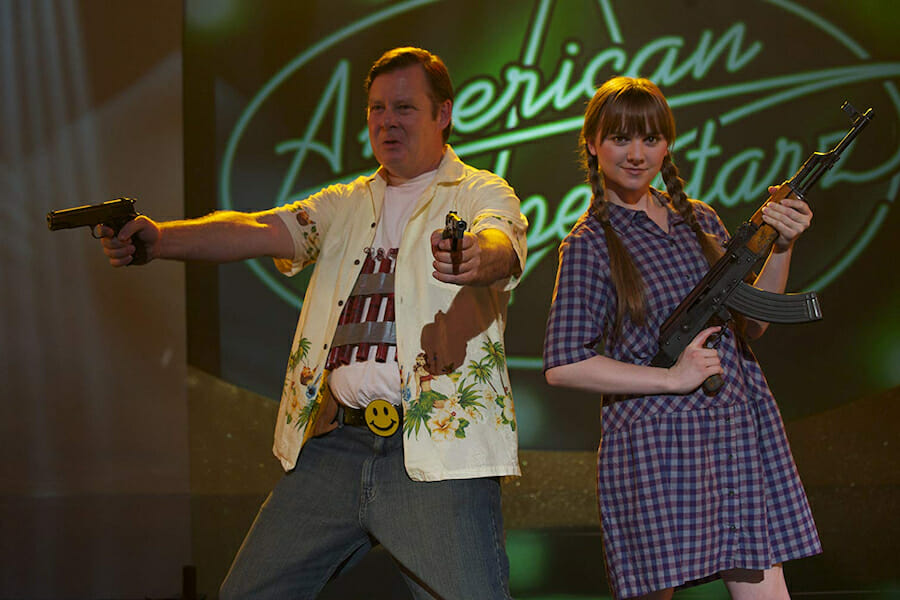
‘God Bless America’ Review
At its heart, Bobcat Goldthwait’s unflinching flick, God Bless America, is about how the media shapes political, gender and age dynamics. GBA’s protagonist is Frank, a straight-laced, middle-aged father who finds himself disgusted with the current generation. This discomfort creeps closest to home when it comes to Ava, his spoiled tween daughter. She has become a narcissistic brat while living with her overwhelmed mother and doting step-father, reduced to a powdered princess who throws tantrums for the likes of not receiving the right smart phone as a present. The generational gap has torn Ava apart from her old man, to the extent that Frank answers “not really” when asked whether he has any family.
In the first of many shared motifs with Scorsese’s Taxi Driver, our alienated protagonist turns to binge-watching TV to kill time. A modern Holden Caulfield, Frank views everyone today as being phony and operating on a herd mentality, so he only keeps company with his television. Frank can’t turn away from the low-brow garbage spewed before him: he can’t tell whether to be more revolted by the “news,” “reality” shows or the ingeniously named “TMI.”
Goldthwait used his stand-up background to absolutely eviscerate contemporary television with his script; an ad for a Farting Pig ringtone is by far the least offensive & idiotic item that Frank views.
Not unlike the Ludovico scene in A Clockwork Orange, Frank is subjected to the psychic barrage of fear-baiting pundits, violent and emotionally abusive reality stars and crassly unethical news anchors, and loathes every second of it. A thinly veiled “American Idol” music competition feasts on the likes of a mentally challenged singer, Steve Clark, with sadistic relish. Most unsettling for Frank is an episode of a “My Super Sweet 16”clone that features a controlling diva named Chloe. Frank sees in Chloe his own daughter, a Me-generation megalomaniac that Ava is quickly growing up to be, crying over cars instead of phones.
GBA focuses on Frank’s relationship with another young woman, a runaway named Roxy. Equally disgusted with America, she convinces Frank to embark on a killing spree with her, offing those “who deserve to die.” Roxy’s youthful ambition -she wants to kill everyone from Diablo Cody to people that say “actually”- rejuvenates Frank, a middle-aged male with a hopeless resignation about the world. Unlike the female co-worker who falsely accuses him of sexual harassment after some office mingling, nubile Roxy fully embraces Frank’s anger and awkwardness. Roxy is ironically eager to become a part of the adult community Frank detests: she fetishizes classic artists like Alice Cooper, while obsessing over why Frank rejects her sexual advances. Frank is enraged by how feminine sexuality and expectations have become a bacchanalia in the media, with young girls a captive audience to it.
Even rebellious Roxy has unconsciously found herself conditioned to the sexualization of girls, so Frank keeps a platonic distance from her, not wanting to become like “Nabokov or Woody Allen.” He instead crafts himself into a father figure for wild-child Roxy, lovingly teaching her to shoot, among other things. Much to the discomfort of us, the audience, most of their genuinely heart-warming moments involve them bonding over murder fantasies. With love, Frank is gently molding his replacement Ava into a killing machine, playing the role of bad parent in more ways than one.
The media rushes to find excuses for their killing spree. Violence on TV, terrorism, political extremism…in reality, Frank is just sick of the new America and shoots those he considers to “be rude.” Roxy, like many young “revolutionaries,” is really just looking for adventure and, ironically, publicity. Old-guard Frank slaughters for principle, while new-school Roxy is young and reckless and in search of validation through the news coverage she claims to hate. Their relationship inevitably evokes that of the DC Snipers: John Allen Muhammad, who like Frank was an angry father missing his children, found & manipulated Lee Boyd Malvo, a troubled runaway, into becoming his protégé.
Who ultimately has culpability for the killing spree? Are Frank and Roxy just two lone wolves who thought too far outside the box, or did social media society create these deadly anti-socials? Frank and Roxy found themselves captives before the captions of news networks & cattiness of reality TV. Did they violently liberate themselves from culture, or did they just reinforce the culture of violence they watched, all the cat-fights and documentaries about killers? Would Roxy have become a murderer without Frank’s fatherly guidance? Is it healthy for “TV to raise your kids”?
Is immorality created by society or is it like Frank’s imaginary brain tumor, all just in our heads? These are the questions that we must wrestle with. GBA is a thoroughly unnerving experience that leaves us feeling like the captive audience, watching Frank watching the sludge that has become the landscape of television and dirty mirror to society. Goldthwait’s work evokes the cynicism and nihilistic violence of the ‘70s counterculture epics “Joe,” the aforementioned Taxi Driver & A Clockwork Orange, with a modern dash of the witty pop culture send-off American Psycho. Like the woman in “Tuff Gurlz” who found herself eating shit, we are left with a horrible taste in our mouths. God Bless America.

